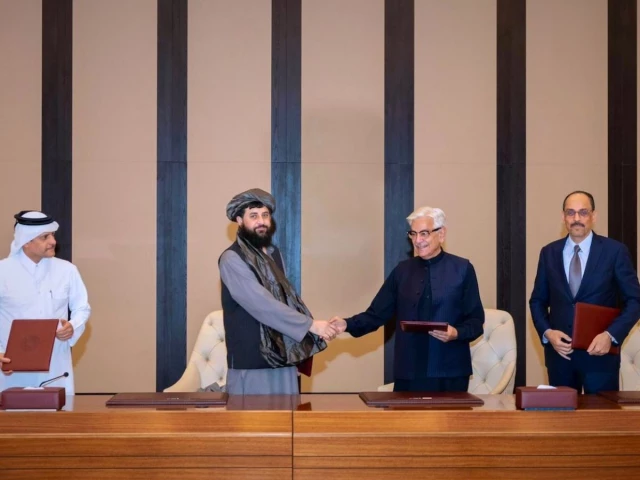The talks between Pakistan and the Taliban government hosted by Turkey lasted nine hours.
Saudi Arabia on Sunday welcomed the announcement of an immediate ceasefire between Pakistan and Afghanistan. Source: x.com/arabnews
Pakistan has presented a detailed plan to Afghanistan aimed at eliminating terrorism emanating from its territory during the second round of bilateral talks in Istanbul.
The talks between Pakistan and the Taliban government hosted by Turkey lasted nine hours, sources said.
The seven-member Pakistani delegation attended the talks and reiterated Islamabad’s demand for the dismantling of terror and training camps inside Afghanistan. Express news reported.
During the meeting, Pakistan presented a comprehensive draft proposal, which the Taliban authorities are now reviewing. Pakistan also reiterated its firm stance on extremist groups, including Fitna al-Khawarij and other militant organisations.
Sources familiar with the matter said the talks aim to establish a consensus on mechanisms that will help address cross-border security challenges and prevent terrorist activities. Further deliberations are expected to take place over the next two days as both sides seek common ground on key security issues.
Asif warns of ‘open war’ with Afghanistan if peace talks fail
Meanwhile, Defense Minister Khawaja Asif said on Saturday that he believes Afghanistan wants peace. Still, the lack of agreement during talks in Istanbul would mean “open war”, just days after both sides agreed to a ceasefire following deadly border clashes.
Read: Pakistan presents firm position on cross-border terrorism in Istanbul talks
He said there had been no incidents in the four to five days since it was agreed and both sides were observing the ceasefire.
“We have the possibility, if no agreement takes place, we have an open war with them,” he said in the televised speech from Pakistan. “But I saw that they want peace.”
Doha lecture
The Istanbul talks follow Pakistan and Afghanistan agreeing to an immediate ceasefire during Doha talks after a week of intense border clashes – the worst since the Taliban seized power in Kabul in 2021.
The ceasefire “has been concluded”, Pakistan’s Defense Minister Khawaja Asif wrote on X last Sunday, saying both sides would meet again on October 25 in Istanbul to discuss “detailed issues”.
Read more: Pakistan and Afghanistan agree on immediate ceasefire in Doha talks
Pakistani delegation, led by Khawaja Asif, including other senior officials. On the Afghan side, the talks were led by Acting Defense Minister Mullah Yaqoob, accompanied by other representatives.
Pakistani officials raised the issue of cross-border terrorist attacks originating in Afghanistan, pointing in particular to groups such as the Gul Bahadur faction and the Tehreek-e-Taliban Pakistan (TTP). Islamabad maintains that these groups have been involved in several deadly incidents in Pakistan in recent months.
Sources familiar with the talks said Pakistan presented a ‘single point agenda’ focusing on dismantling terror networks. “Pakistan has made it clear that the Afghan government must eliminate terrorist organizations and their hideouts,” sources said.
Taliban spokesman Zabihullah Mujahid said in a statement that the parties had agreed to a full and meaningful ceasefire.
Tensions escalated after unprovoked firing by the Afghan Taliban regime
Read also: Explained: Pakistan-Afghanistan border conflict
Tensions along the Pak-Afghan border escalated on October 12 when clashes erupted after the Afghan Taliban regime opened unprovoked fire at several locations in Khyber-Pakhtunkhwa (KP) and Balochistan, prompting a swift and forceful response by the Afghan army, which killed several Afghan soldiers and dozens of Pakistani soldiers.
The coordinated attack originated from several key sectors including Angoor Adda, Bajaur, Kurram, Dir, Chitral in Khyber-Pakhtunkhwa and Baramcha in Balochistan. The firing, security sources said, was aimed at facilitating the illegal entry of Khwarij – the state-designated name for the outlawed Tehreek-i-Taliban Pakistan (TTP) – into Pakistani territory.
“The Pakistan Army responded immediately and decisively,” security sources said. “The counteroffensive effectively targeted and destroyed several Afghan positions on the border. Dozens of Afghan soldiers and Khwarij were killed in retaliatory fire”.



